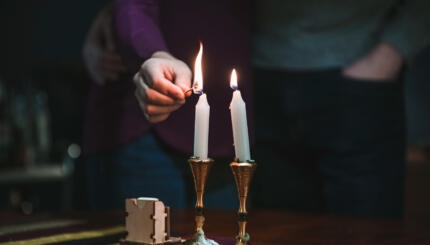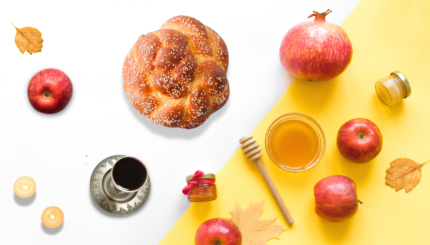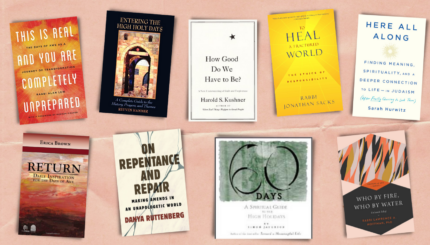The images of the secular New Year—Times Square, Champagne in fancy glasses, funny hats and noisemakers—are all fun and happy. By contrast the images of Rosh Hashanah—a shofar, people praying, apples dipped in honey—are more subdued and complicated. They suggest introspection mixed with hope, intention and possibility.
And I’m glad it is this way because this combination of emotions allows both for the celebration of that which might be in the year to come and face the reality of loss of all that is no longer possible.
Sitting in the same space we sat in last year and hearing the same somber tunes we hear year after year grounds us in continuity. We know that come what may, we can be sure this place, these sounds, these words will be here again next year, just as they were here last year, just as they were here ten years ago.
But the continuity also reminds us of what has changed in the last year. Some of the changes are for the better, the new love, the child now wearing a tallit for the first time, the new job, the new home. But not all the changes are for the good. Looking around the sanctuary, or the dining room table, at familiar faces we may be acutely aware of those who are not there. Or maybe the tunes and prayers are familiar but the sanctuary and all the people because you have had to move communities after a messy divorce or a job change. Maybe the clothes are old because buying new ones was simply not an option with this year’s finances. Our losses, whatever form they take, can be painfully clear at Rosh Hashanah.
The liturgy of the season returns to the refrain, “Hashiveinu Adonai, Elecha, V’nasuvah, Hadesh Yameinu K’kedem” “Return us Adonai to you and we will return, renew our days as in the days of old.” The traditional understanding of this prayer speaks to the need to rededicate ourselves to the path of Torah so that the presence of God will be as profound as it was in ancient times. But my own experience with the loss of loved ones at Rosh Hashanah, gave me a different way to understand it. Loss can alienate us from God and from that which is holy, we need help and support to be able to feel grace and the presence of the sacred. We want to feel the feeling of blessing that has slipped away.
My favorite version of this prayer, one set to the Rosh Hashanah nusach or tunes, is somber and has the power to bring me to tears. I remember the last day of my grandmother’s life, the first day of Rosh Hashanah over 25 years ago. It was the only time I ever saw her pray, I got to hear her sing the traditional tunes. The next day she was gone. Each year since, on Rosh Hashanah I am returned to that special relationship and to her absence.
At Rosh Hashanah, we do need to look forward and imagine how we will improve ourselves, our communities and our world in the year to come. But we also should allow ourselves to grieve for that which has been lost and is not retrievable. Services might be somber, but it is also appropriate cry and feel the power of the music, the sounds, the liturgy and the visuals the moment. Our sense of loss can and should propel us to reach out to those who are still with us, to seek help and support for that which we cannot change on our own. Judaism gives us permission and space to feel both the joys and the pains of life. Unlike the celebration of the secular New Year, Rosh Hashanah encourages us to take stock, not to ignore the bad, even as we hope for a better year to come.
Adonai
Pronounced: ah-doe-NYE, Origin: Hebrew, a name for God.
Rosh Hashanah
Pronounced: roshe hah-SHAH-nah, also roshe ha-shah-NAH, Origin: Hebrew, the Jewish new year.
Torah
Pronunced: TORE-uh, Origin: Hebrew, the Five Books of Moses.



